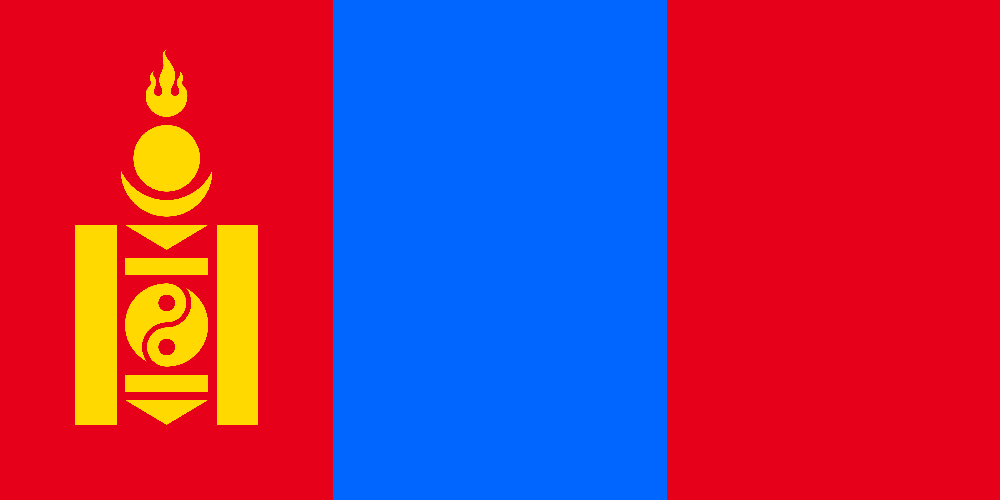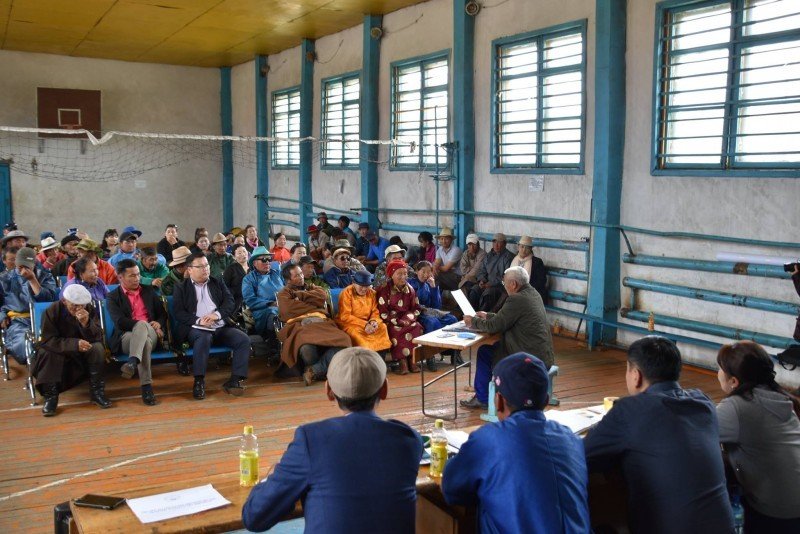
The MNFPUG and Pasture User Groups (PUGs) of the Khuvsgul and Zavkhan aimags have jointly organized meetings with approximately 260 herders from the baghs of Renchinjugnai, Burheer, Uranhairhan, Jargalant, and Zuunmod in Tsetserleg soum. At the meetings, the "Green Gold and Livestock Health" project was introduced to attendees, and workshops were provided on the process of organizing local PUGs. These meetings were attended by Dashdavaa, the chairman of the People's Representatives Assembly of the soum, and Tsogt, the governor of the soum, both of whom expressed their full support for the project.
At the beginning of the workshops, G. Enhbold, head of the Aimag Pasture User Group, provided a detailed presentation on how to organize a Pasture User Group (PUG), select a leader, adopt bylaws and a future outlook for the organization, cooperate with local administrations, coordinate pasture management in line with land management plans, organize PUG meetings, and raise a common fund for the group. B. Tserenmyagmar, a member of Zavkhan Aimag's Pasture User Groups, and B. Sharavsambuu, leader of the Dulaanhairhan Pasture User Group, shared their experiences with preventing pasture degradation in their local areas and explained how they set up their herder organizations. They also showed photographs of their actions and shared their recommendations on how newly-established herder organizations can work most effectively.

B. Sharavsambuu remarked that, "the most important thing for a newly-formed Pasture User Group is drafting an action plan. This should be based on dialogue with the herders, while setting forth both practical and creative goals. A common fund should also be set up. When we set up our association, the fund was raised from 14 families, with 50,000 tugriks contributed by each family. Now, after 9 years, our Common fund has increased to 7.9 million tugriks. It proves that our PUG has become more stable and sustainable."
After the presentations, herders in the audience asked many questions. Questions included the significance of herder organizations, how pasture borders can be put to practice, how to best rotate pastures, where to sell raw materials and how to connect with domestic companies and factories.
At the end of the workshop, participants concluded that organizing and using pastures in a seasonal manner is beneficial for them, and can open gateways to more income. They therefore decided to organize their own PUGs.
Herders of the Renchinjugnai and Burheer baghs, where they share pastures among themselves, were divided into three groups, named "Ogzom Hairhan", "Duuren Tolgoi", "Ereenii Tseej". These elected M. Tsetsegsaihan, Davaahuu and Enkhbayar as their group leaders, and devised an action plan.
The "Ogzom Hairhan" PUG held its first meeting, setting for itself the short-term goals of raising money for a common fund, restoring livestock washing facilities, building fences for livestock vaccination as well as for hay from "Hahiur Tolgoi", "Buurug", "Urgun Shireg" and "Ulaan Ergiin Denj", and the eradication of rodents. After its meeting, the "Ogzom Hairhan" herders held a mini wrestling festival among the children from their local area, and awarded prizes to the winners.
Meanwhile, two PUGs in Jargalant bagh, and four PUGs in Zuunmod bagh were established. They held their first plenary meetings for all members, elected their leaders, and started working to outline their action plans.
Uranhairhan, one of the biggest baghs, located 60 km away from the aimag center, has 247 households owning 65,421 units of livestock. Herders of this bagh agreed to set up four PUGs, including "Tesiin Ekh", "Ikh Ovoo" and "Dunchee".
G. Enkhbold, leader of the Aimag's Pasture Users Group, said: "Our APUG is currently in talks with domestic factories and companies about a contract to supply wool, hides, leather and skin from yak and sheep. I've introduced this contract proposal to herders and received their suggestions and ideas. They have expressed their support and cooperation for this contract. Last winter was quite hard for the herders of Tsetserleg soum because of the heavy snowfall. Livestock numbers were reduced significantly, and the livelihoods of herders were harshly affected. As we are committed to helping them use their pastures properly, increase price of raw materials for livestock and improve their income, the herders are enthusiastic about cooperating with us.”
D. Damjinragchaa, leader of the Tsetserleg soum PUG, says: "The most pressing issues that we are facing now are the proper use of pastures and directly connecting herders to domestic producers. I hope, with the help of this group, that herders can be equipped with the necessary means to solve these problems. With the establishment of such pasture groups, herders now have their own organizations which support their traditional pasture customs, protect the pasture ecology, and both encourage the transfer of nomadic knowledge to the next generation and record this knowledge for posterity through organized actions and institutions."
Published: 2017-10-27 07:19:03






